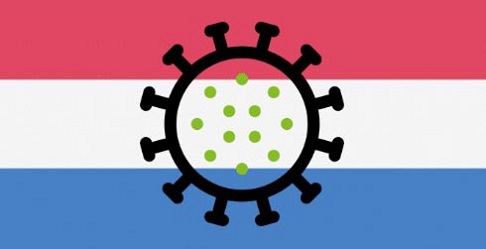Nikhil Prasad Fact checked by:Thailand Medical News Team Jul 23, 2024 9 months, 3 days, 12 hours, 17 minutes ago
COVID-19 News: The Netherlands is currently grappling with a resurgence of COVID-19 cases, as the highly infectious virus shows no signs of abating. According to recent surveillance reports, the circulation of SARS-CoV-2 remains elevated across the country. The national average viral load detected in wastewater has surged by 18% in the week spanning from 8 to 14 July 2024. This increase aligns with the uptick in COVID-19 positive cases reported through the Infection Radar survey, which rose to 1.3% last week.
https://www.rivm.nl/en/coronavirus-covid-19/current/weekly-update
 COVID-19 infections now hitting new records in Netherlands
COVID-19 infections now hitting new records in Netherlands
The situation is further compounded by the detection of SARS-CoV-2 in samples taken from patients visiting general practitioners (GPs) with acute respiratory symptoms. Lab reports also confirm a rise in SARS-CoV-2 cases, highlighting the pervasive presence of the virus.
State of Respiratory Infections
The prevalence of respiratory infections has been on an upward trajectory since mid-May 2024, peaking around mid-June. Since then, the numbers have been fluctuating but remain at a higher level than earlier in the year. These fluctuations are largely attributed to SARS-CoV-2, though other viruses and bacteria are also contributing to the respiratory illness landscape.
Wastewater surveillance, a reliable indicator of viral activity, continues to show a rising number of coronavirus particles. The share of participants in the Infection Radar with respiratory complaints increased from 4.6% in week 27 to 5.1% in week 28.
https://www.rivm.nl/luchtweginfecties/actuele-cijfers
Among the samples examined by RIVM, rhinovirus/enterovirus and SARS-CoV-2 were the most common pathogens detected.
GPs also reported that the majority of respiratory complaints in the past week were linked to SARS-CoV-2, although flu-like symptoms remain relatively low. Virological reports from Dutch laboratories corroborate these findings, showing a predominance of SARS-CoV-2 and rhinovirus among the tested samples.
The New Variant: KP.3
A new COVID-19 variant called KP.3 which belongs to a class of variants known as FLuQE, is rapidly spreading throughout the Netherlands, marking the most significant summer outbreak since 2021. This variant, a group of Omicron subvariants officially classified has managed to bypass existing immunity, contributing to the current surge in cases.
https://www.thailandmedical.news/news/forget-about-sars-cov-2-flirt-variants-kp-1-1-and-kp-2-new-fluqe-variant-kp-3-expected-to-rapidly-become-globally-predominant-wreaking-havoc
A new sub-lineage of KP.3 has also emerged and is just starting to wreak havoc in parts of Europe.
ews/news/forget-about-the-kp-3-lb-1-kp-2-3-variants-the-new-sars-cov-2-kp-3-1-1-is-leading-the-current-global-covid-19-surge">https://www.thailandmedical.news/news/forget-about-the-kp-3-lb-1-kp-2-3-variants-the-new-sars-cov-2-kp-3-1-1-is-leading-the-current-global-covid-19-surge
Sewage water measurements, a key metric for tracking virus spread, indicate that the current level of coronavirus particles is 14 times higher than it was at the same time last year. This level surpasses even the notorious summer of 2021, when the Delta variant caused a major spike in infections.
Hospital Admissions and Public Health Concerns
Despite the alarming rise in COVID-19 cases, hospital admissions have remained relatively stable. Local experts made claims to local
COVID-19 News journalists that the current wave is distinct from the 2021 situation. They claim that the prevailing variants are causing milder illnesses, and the population's immunity, built through vaccinations and previous infections, is providing a significant buffer against severe outcomes.
Nevertheless, public health officials are not complacent. There is growing concern about the long-term impacts of COVID-19, particularly Long COVID, where symptoms persist for a year or longer. While the likelihood of developing Long COVID is claimed to be decreasing, new cases continue to emerge, posing a significant public health challenge.
Looking Ahead
The situation in the Netherlands underscores the need for continued vigilance and adaptive public health strategies. The dynamic nature of SARS-CoV-2, with its evolving variants, necessitates robust surveillance and a proactive approach to managing outbreaks. Public health institutions like RIVM remain at the forefront, monitoring trends and providing critical updates to guide policy and protect public health.
As the Netherlands navigates this latest surge, the focus remains on mitigating the spread, protecting vulnerable populations, and minimizing the impact on the healthcare system. The lessons learned from previous waves and the advancements in medical science provide a strong foundation for addressing the current challenges posed by COVID-19 and its variants.
For the latest
COVID-19 News, keep on logging to Thailand Medical News.
Read Also:
https://www.thailandmedical.news/news/after-a-june-covid-19-peak-hospitalizations-in-uk-rises-again-as-positivity-rate-hits-15-86-percent
https://www.thailandmedical.news/news/covid-19-infections-in-romania-doubles-within-a-week
https://www.thailandmedical.news/news/germany-reports-rising-covid-19-infections-and-hospitalizations-as-berlin-leads-the-surge
